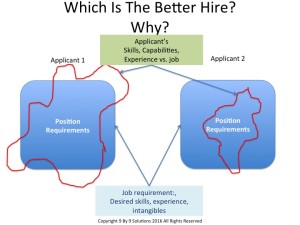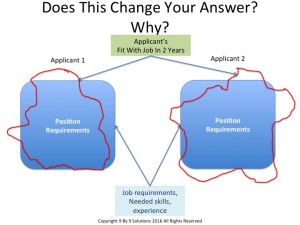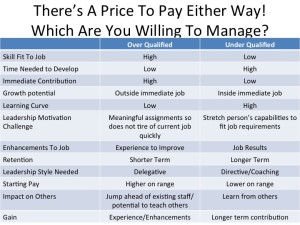Overqualified: Having more education, training, or experience than is required for a job or position. Dictionary.com
Underqualified: Insufficiently qualified for a particular job. http://www.oxforddictionaries.com/definition/english/underqualified
Question: Does the right hire depend more on the person who is hiring than the person being hired?
Copyright 9 By 9 Solutions 2016 All Rights Reserved



Dear Wilson,
This is a very impressive post.
There are two candidates. Overqualified and underqualified.
According to my experience;
1- This hiring depends more on hiring person capability.
2- Most of the organizations are very poor in choosing and selecting the right candidates due to the their poor HR capabilities.
3- Age is a problem and they do not consider the advantages and disadvantages of the candidates. They directly eliminate the aged one without evaluating the necessary skills. Because they don’t have enough experience, know-how and people skills.
4- Many leaders see Leadership development programs as a cost and they are trying to keep their chair for the long-term. They afraid from right skilled talents and competition.
5- Many leaders focus on plans, meetings and papers. They miss the real operational processes and issues. They are not open and share the necessary info.
6- Leadership development programs are generally successful on the paper. Because there is no real exposure in time to different issues in the factory, supply, operations, marketing, sales, finance and HR functions.
The right way must be;
1- Companies have to prefer overqualified candidates and train people with them.
2- Firms have to work with the highly skilled HR people.
3- Age must not be an issue. They have to look at experience, knowledge, and skills to achieve the long-term organizational success.
4- Companies have to work with the leaders who have competent skills that can solve the real issues in business for today or the future.
Thank you.
Most managers don’t know talent, but they do know who talks the best game.
Educators, businesses, and consultants have made matters much worse by preaching that we are all leaders. Leaders have followers and if no one is following us we are not leaders.
Saying that we lead ourselves is a truism and need not be stated or implied.
Employers have tried all sorts of things to create successful employees who do not need to be managed. Teaching/preaching leadership has been replaced by employee engagement. That won’t work either until managers learn how to hire and manage employees who will become engaged if managed well, treated fairly, and paid accordingly.
Few leaders/managers ever address their own failures.
People get to be managers because they were very good at doing the work of the people they will manage or they earned management degrees neither of which predict job success as a manager.
As managers move up the career ladder they focus on what they had focused on to get there. Once at the top they focus on what they are interested in doing. That may be what got them to the top but that may not be what they need to do. However, who is to tell the boss he is focusing on the wrong things? Even if he is told who can influence him to change his focus?
Leaders often ask the wrong questions such as questions that start with “Do you know what I.”
* Do you know what I mean?
* Do you know what I want?
* Do you know what I said?
* Do you know what I want you to do?
* Do you know what is required?
etc.
All such questions presume the listener knows but is that reasonable? No, because the answers are almost always “yes”; no one wants to tell the boss that they don’t know what he just said, means, wants, etc. The problem and the fix resides with the boss, too many leaders and managers speak too quickly. People hear what they hear and remember what they remember but all too often what they remember is not what was said or only part of what was said or was not said at all.